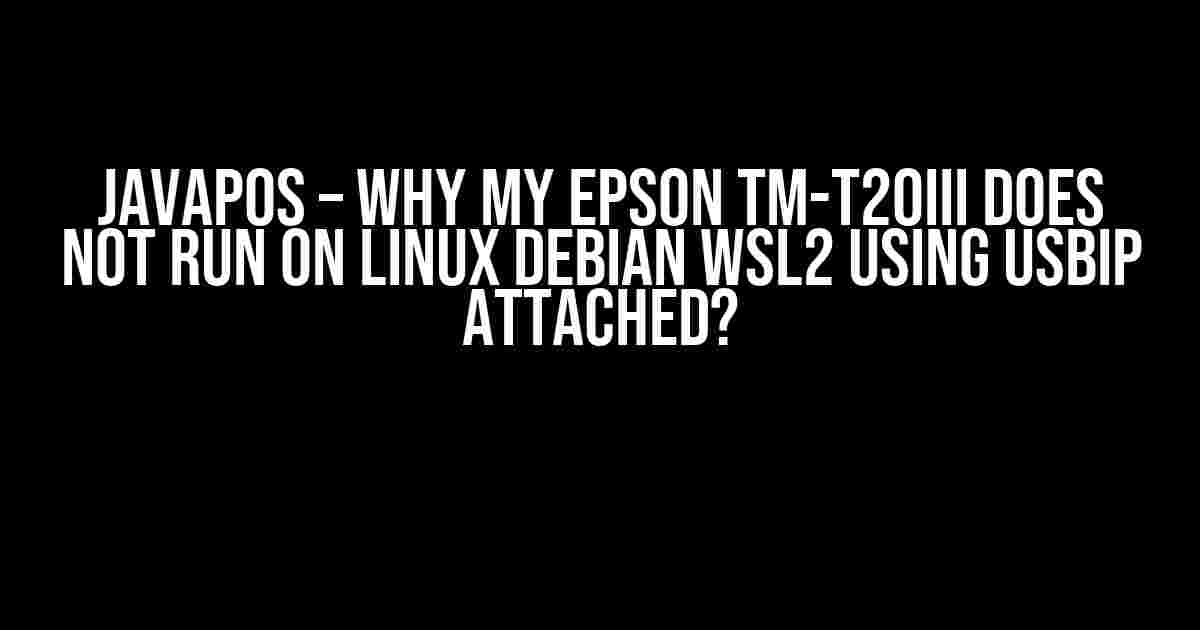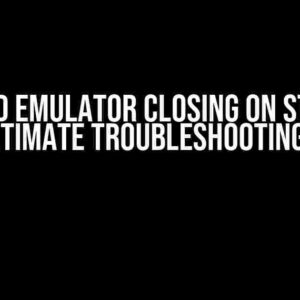If you’re reading this article, chances are you’re frustrated and stuck with getting your EPSON TM-T20III printer to work on Linux Debian WSL2 using usbip attachment. Don’t worry, you’re not alone! In this comprehensive guide, we’ll dive into the world of JavaPOS, explore the possible reasons behind this issue, and provide step-by-step solutions to get your printer up and running.
What is JavaPOS?
JavaPOS (Point of Sale) is a Java-based API used to control POS devices, including printers, cash drawers, and scanners. EPSON, a leading POS device manufacturer, provides JavaPOS drivers for their products, allowing developers to create POS applications that interact with their devices. In the case of the EPSON TM-T20III, JavaPOS is the go-to solution for printing receipts and other documents.
Why won’t my EPSON TM-T20III work on Linux Debian WSL2?
Before we dive into the solutions, let’s understand the potential reasons why your EPSON TM-T20III isn’t working on Linux Debian WSL2 using usbip attachment:
- usbip attachment issues: The usbip kernel module might not be properly configured or loaded, causing the printer to be inaccessible.
- JavaPOS driver compatibility: The JavaPOS driver for the EPSON TM-T20III might not be compatible with the Linux Debian WSL2 environment.
- Permission and access control: The user or application might not have the necessary permissions to access the printer device.
- Device recognition and configuration: The printer device might not be properly recognized or configured in the Linux environment.
Step-by-Step Solution to Get Your EPSON TM-T20III Working
Now that we’ve identified the potential issues, let’s follow these steps to get your EPSON TM-T20III working on Linux Debian WSL2 using usbip attachment:
Step 1: Verify usbip attachment and kernel module
First, ensure that the usbip kernel module is properly loaded and configured:
$ sudo modprobe usbip
$ sudo usbip attach -r remote-host -b 1-1.3
Replace `remote-host` with the hostname or IP address of the machine where the printer is physically connected. The `-b 1-1.3` option specifies the USB bus and device number of the printer.
Step 2: Install and configure JavaPOS
Install the JavaPOS driver for the EPSON TM-T20III from the EPSON website:
$ sudo apt-get update
$ sudo apt-get install java-11-openjdk
$ wget https://download.epson-biz.com/modules/envMDR.php?mdl=EPSON_TM-T20III&dmd=JavaPOS
$ sudo dpkg -i epson-java-pos-*.deb
Configure the JavaPOS settings file (`jpos.xml`) to point to the correct printer device:
<jpos>
<device>
<logicalName>TM-T20III</logicalName>
<physicalName>/dev/usb/lp0</physicalName>
</device>
</jpos>
Edit the `jpos.xml` file to reflect the correct device path for your printer. In this example, we’re using `/dev/usb/lp0` as the physical printer device.
Step 3: Set permissions and access control
Ensure that the user or application has the necessary permissions to access the printer device:
$ sudo chown -R $USER:$USER /dev/usb/lp0
$ sudo chmod 666 /dev/usb/lp0
Grant the necessary permissions to the user or group that will be accessing the printer.
Step 4: Test and verify JavaPOS connectivity
Use the JavaPOS installation’s `JposTest` utility to verify connectivity to the printer:
$ sudo java -jar JposTest.jar
If the test is successful, you should see a printer status report indicating that the JavaPOS driver is communicating with the EPSON TM-T20III.
Step 5: Integrate with your POS application
Finally, integrate the JavaPOS driver with your POS application, using the configured settings and device path:
import jpos.*;
public class PrintReceipt {
public static void main(String[] args) {
// Initialize JavaPOS
JposService service = new JposService("TM-T20III", "/dev/usb/lp0");
// Open the printer device
service.open();
// Print a test receipt
service.print("Hello, World!");
// Close the printer device
service.close();
}
}
This sample code demonstrates how to initialize the JavaPOS service, open the printer device, print a test receipt, and close the device.
Troubleshooting Common Issues
If you encounter issues during the setup process, refer to the following troubleshooting tips:
| Error Message | Solution |
|---|---|
| usbip attachment failed | Verify that the usbip kernel module is loaded and configured correctly. Check the system logs for errors. |
| JavaPOS driver not found | Ensure that the JavaPOS driver is installed and configured correctly. Check the installation logs for errors. |
| Permission denied | Verify that the user or application has the necessary permissions to access the printer device. Check the device permissions and ownership. |
| Printer not recognized | Verify that the printer device is properly recognized and configured in the Linux environment. Check the system logs for errors. |
By following these steps and troubleshooting common issues, you should be able to get your EPSON TM-T20III printer working on Linux Debian WSL2 using usbip attachment.
Conclusion
In this comprehensive guide, we’ve explored the world of JavaPOS, identified potential issues affecting the EPSON TM-T20III printer on Linux Debian WSL2, and provided step-by-step solutions to get your printer up and running. By following these instructions and troubleshooting common issues, you should be able to overcome the challenges and successfully integrate your EPSON TM-T20III with your POS application.
Remember to stay calm, be patient, and don’t hesitate to seek help if you encounter any issues. With persistence and the right guidance, you’ll be printing receipts like a pro in no time!
Frequently Asked Question
If you’re having trouble getting your EPSON TM-T20III to work on Linux Debian WSL2 using usbip attached, you’re not alone! Here are some answers to common questions that might help you troubleshoot the issue.
Q1: Does EPSON TM-T20III support Linux Debian WSL2?
While EPSON TM-T20III is designed to work with various operating systems, including Linux, it’s essential to note that WSL2 (Windows Subsystem for Linux 2) is a Windows 10 feature that allows running a Linux environment on top of Windows. As a result, the printer might not work seamlessly with WSL2, especially when using usbip attached. You may need to tweak some settings or use workarounds to get it running.
Q2: Is JavaPOS compatible with Linux Debian WSL2?
JavaPOS is a Java-based API that allows developers to create platform-independent POS applications. While JavaPOS itself is compatible with Linux, the specific implementation and libraries provided by EPSON for the TM-T20III might not be fully compatible with WSL2. You may need to use alternative libraries or implementations that are specifically designed for Linux.
Q3: How do I configure usbip to work with EPSON TM-T20III on Linux Debian WSL2?
To configure usbip, you’ll need to bind the USB device to the Linux Debian WSL2 environment. You can do this by running the command `usbip bind -b
Q4: Are there any alternative methods to connect EPSON TM-T20III to Linux Debian WSL2?
Yes, there are alternative methods to connect your EPSON TM-T20III to Linux Debian WSL2. You can try using the printer’s network interface (if available) or use a USB-over-IP solution like `usb-redir` or `usb-redirector`. These solutions might require additional configuration and setup, but they can provide a more reliable connection.
Q5: Where can I find more resources and support for EPSON TM-T20III on Linux Debian WSL2?
For more resources and support, you can visit the EPSON Developer Center, which provides documentation, SDKs, and sample code for various platforms, including Linux. Additionally, you can search online for forums, communities, and blogs dedicated to EPSON printers on Linux. Don’t hesitate to reach out to EPSON’s technical support or Linux community forums for further assistance.



